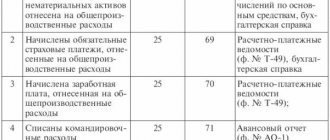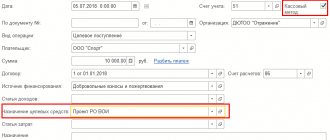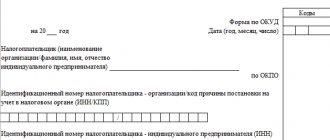Despite economic difficulties, housing construction is gaining momentum, returning to pre-crisis levels. To finance the construction of an apartment building, developers raise funds from citizens under agreements for participation in shared construction. The legal basis for such activities is established by Federal Law No. 214-FZ of December 30, 2004 (hereinafter referred to as Law No. 214-FZ).
For accountants, the application of this law raises many questions. Among them: how to keep records if the developer is building a house on his own? The situation is very common, especially in the regions. But in terms of taxation it is ambiguous. Resolution of the Plenum of the Supreme Arbitration Court of the Russian Federation dated July 11, 2011 No. 54 “On some issues of resolving disputes arising from contracts regarding real estate that will be created or acquired in the future” (hereinafter referred to as Resolution No. 54) did not add clarity.
The explanations of the “highest” judges apply to tax disputes. This is evidenced by the letter of the Federal Tax Service of Russia dated September 22, 2011 No. SA-4-7/15581. It instructs tax inspectorates to use Resolution No. 54 in their work. And indeed, they begin to refer to it. However, so far without success. An example of this is the resolution of the Federal Antimonopoly Service of the East Siberian District dated April 15, 2013 in case No. A78-3003/2012.
We will try to apply Resolution No. 54 (clause 11) and we, as taxpayers, in our own interests. It says: the provisions of Law No. 214-FZ are special in relation to the provisions of the Civil Code of the Russian Federation on the purchase and sale of a future thing.
We take this thesis (Article 431 of the Civil Code of the Russian Federation) “for service.”
Combining functions is a fallacy
Based on Law No. 214-FZ (clause 1, article 4), under an agreement for participation in shared construction, the developer undertakes to build an apartment building on his own and (or!) with the involvement of other persons. After receiving permission to put the house into operation, the developer must transfer the shared construction object to the participant in shared construction (in common parlance - the shareholder).
When a developer engages a general contractor for construction, its taxation does not cause any particular controversy.
But let’s assume that the developer has chosen a different path: he intends to build a house “in an economic way.” To do this, certificates of admission to types of work that affect the safety of capital construction projects are required (Clause 2, Article 52 of the Civil Code of the Russian Federation). Of course, he acquired such documents.
From the contract, shareholders may not know exactly how the developer plans to build the house. But information about the list of contractors carrying out basic construction, installation and other work must be reflected in the project declaration (clauses 1 and 4 of Article 19, subclause 10 of clause 1 of Article 21, Law No. 214-FZ). That is, “you can’t hide an awl in a bag.”
If the developer does not enter into construction contracts, but carries out construction and installation work independently, then he does not have contractors. How to indicate its status?
There is a widespread opinion that in this case the developer acts as a contractor (clause 1 of Article 740 of the Civil Code of the Russian Federation) “part-time”. That is, it combines two functions in the construction process. But this formulation is incorrect...
There is a widespread opinion that in this case the developer acts as a contractor (clause 1 of Article 740 of the Civil Code of the Russian Federation) “part-time”. That is, it combines two functions in the construction process. But this formulation is incorrect. Firstly, the developer cannot enter into a contractual relationship with himself. And secondly, he did not conclude contracts for construction work with shareholders.
This is where Resolution No. 54 comes to our aid. Based on the explanations of representatives of the Supreme Arbitration Court of the Russian Federation, it is permissible to assert that under such circumstances, a transaction with a shareholder can be considered as a contract for the sale and purchase of a future property. Namely, Article 455 of the Civil Code states: a contract can be concluded for the purchase and sale of not only goods available to the seller at the time of conclusion of the contract, but also goods that will be created by the seller in the future, unless otherwise follows from the nature of the goods. In this case, the goods are shared construction objects, that is, premises in an apartment building.
Please note: the fact that the seller created the goods does not transfer him to the category of contractor. Therefore, there are two different ways to obtain goods that do not exist on the date of the transaction:
- under a purchase and sale agreement;
- under a contract.
Expenses
Reflect the costs of building a residential building as they arise and accumulate them in the debit of account 08-3 on an accrual basis from the beginning of construction. In this case, the developer makes the following entries:
Debit 08-3 Credit 60 – the cost of work performed by the contractor is taken into account as part of construction costs;
Debit 19 Credit 60 – VAT claimed by the contractor is taken into account.
Input VAT on the cost of contract work is included in the costs of constructing a residential building:
Debit 08-3 Credit 19 - taken into account as part of construction costs, input VAT on the cost of work performed by the contractor.
The developer reflects the costs of providing services to shareholders in accounting in the general manner according to the rules of PBU 10/99 as the costs of maintaining the developer's service (clause 5 of PBU 10/99). The developer recognizes all costs in the periods in which they arose (clauses 16–18 of PBU 10/99). Accounting for these expenses is usually kept on account 26 “General expenses”, to the debit of which are written off the direct and indirect expenses of the developer himself associated with the provision of construction organization services:
Debit 26 Credit 02 (10, 23, 25, 68, 69, 70, 76, 60...) – reflects the developer’s expenses for organizing construction;
Debit 19 Credit 60 (76) – input VAT on expenses for the provision of developer services for organizing construction is taken into account.
Developer services under agreements for participation in shared construction are not subject to VAT (subclause 23.1, clause 3, article 149 of the Tax Code of the Russian Federation). Therefore, input VAT on costs associated with the provision of this service is included as expenses.
Debit 26 Credit 19 – charged to the costs of input VAT on expenses for the provision of services to the developer in organizing construction.
Situation: how can a developer reflect in accounting the costs of constructing a residential building, in which some of the apartments belong to shareholders, and some were built at the expense of the developer’s own funds and are intended for sale? The developer is constructing a residential building by contract.
The procedure for reflecting in accounting the costs of constructing a residential building built both at the expense of equity holders and at the expense of the developer’s own funds is currently not regulated by accounting regulations. Therefore, the organization must independently develop this procedure and consolidate it in its accounting policies for accounting purposes (clause 7 of PBU 1/2008).
For example, expenses in this case can be taken into account in the following order. The developer accumulates costs for the construction of a residential building in the debit of account 08-3 “Construction of fixed assets” on an accrual basis from the beginning of construction (Instructions for the chart of accounts, clause 2.3 of the Regulations approved by the Ministry of Finance of Russia dated December 30, 1993 No. 160). In accounting, these transactions are reflected by postings:
Debit 08-3 Credit 60 - the cost of work performed by the contractor is taken into account as part of the costs of constructing a residential building.
Upon completion of construction, the developer determines the amount of capital investments separately for apartments of shareholders and separately for apartments for sale. These values can be calculated, for example, based on the area of apartments. To do this, use the formulas:
| The amount of capital investments attributable to the apartments of shareholders | = | Total capital investment | × | Total area of apartments of shareholders | : | Total area of all apartments |
| Capital investment amount for apartments for sale | = | Total capital investment | × | Total area of apartments for sale | : | Total area of all apartments |
Prepare your calculations using an accounting document. Based on it, make an accounting entry for the amount of capital investments that relate to apartments built for shareholders:
Debit 76 subaccount “Settlements with equity holders” Credit 08-3 – capital investments that relate to apartments built for equity holders are written off.
The amount of capital investments that relate to apartments built for sale must be immediately distributed among the apartments by organizing analytical accounting on account 43.
Calculate the amount of capital investment related to each apartment using the formula:
| The amount of capital investment per apartment for sale | = | Capital investment amount for all apartments for sale | × | Total area of one apartment for sale | : | Total area of all apartments for sale |
Please also document your calculations using an accounting document. Based on it, make an accounting entry for the amount of capital investments that relate to each apartment built for sale:
Debit 43 subaccount “Apartment No...” Credit 08-3 – finished products (constructed apartment) are accepted for accounting.
This method of accounting for construction costs is recommended by the Russian Ministry of Finance in letter dated May 18, 2006 No. 07-05-03/02.
An example of how the distribution of costs for the construction of a residential building is reflected in the developer’s accounting. Some of the apartments are financed by shareholders, and some by the developer. The house is being built by contract
Alpha LLC (developer) entered into agreements in 2015 for participation in shared construction of a residential building with participants in shared construction. According to the terms of the agreements, the amount of remuneration for the developer is determined in the form of savings of target funds of shareholders upon completion of construction.
The terms of participation agreements in shared construction provide for an advance payment in the amount of 100 percent of the total amount of the agreement. By the start of construction, all shareholders made an advance payment. The total amount of funds received from shareholders reflected on the loan of account 76 is RUB 38,232,000.
Contract work was completed in the amount of RUB 37,760,000. (including VAT 18% – RUB 5,760,000). This amount was transferred to the contractor in April 2015.
The cost of maintaining the developer's service amounted to RUB 1,770,000. (including VAT – 250,000 rubles).
The amount of capital investments reflected in the debit of account 08-3 amounted to RUB 37,760,000. And the amount of expenses for maintaining the developer, reflected in the debit of account 26, is 1,770,000 rubles.
The completed house was put into operation in November 2015. In the same month, the apartments were transferred to shareholders according to acceptance certificates. The total area of all apartments in the constructed residential building is 1400 sq. m. m.
At the same time, there were no shareholders for two apartments. After construction was completed, Alpha acquired ownership of them and put these apartments up for sale:
- apartment No. 25 with a total area of 64 sq. m;
- apartment No. 26 with a total area of 76 sq. m.
Thus, the total area of the apartments for sale was 140 sq. m. m (64 sq. m + 76 sq. m), and the total area of apartments for transfer to equity holders is 1260 sq. m. m (1400 sq. m – 140 sq. m).
The apartments for sale were sold in December 2015. Alpha sold apartment No. 25 for 3,000,000 rubles, and apartment No. 26 for 3,500,000 rubles. In the same month, the buyers of the apartments transferred payment for them.
For the convenience of calculations and tracking information about the condition of property, Alpha’s accountant opened sub-accounts for the following accounts:
- to account 43 – subaccounts “Apartment No. 25” and “Apartment No. 26”;
- to account 62 – subaccounts “Settlements with equity holders” and “Settlements with buyers”;
- to account 08-3 - subaccounts “Capital investments in apartments of shareholders” and “Capital investments in own apartments”.
In Alpha accounting, these transactions are reflected by postings.
In April 2015:
Debit 60 Credit 51 – 37,760,000 rub. – funds transferred to the contractor.
In November 2015:
Debit 08-3 Credit 60 – 32,000,000 rub. – the contractor’s work has been accepted;
Debit 19 Credit 60 – 5,760,000 rub. – reflects input VAT on the cost of the contractor’s work on the construction of a residential building;
Debit 08-3 Credit 19 – 5,760,000 rub. – input VAT on the cost of the contractor’s work is taken into account in the amount of capital investments.
The Alpha accountant distributed the amount of capital investments accumulated on account 08-3 (RUB 37,760,000) as follows:
- for apartments of shareholders – 33,984,000 rubles. (RUB 37,760,000: 1400 sq. m × 1260 sq. m);
- for apartments for sale – RUB 3,776,000. (RUB 37,760,000: 1400 sq. m × 140 sq. m).
This distribution is reflected by internal turnover in account 08-3:
Debit 08-3 subaccount “Capital investments in apartments of shareholders” Credit 08-3 – RUB 33,984,000. – the amount of capital investments in the shareholders’ apartments has been determined;
Debit 08-3 subaccount “Capital investments in own apartments” Credit 08-3 – RUB 3,776,000. – the amount of capital investments in some of your own apartments has been determined.
The amount of expenses for maintaining the developer service is also subject to distribution:
- for apartments of shareholders – 1,593,000 rubles. (RUB 1,770,000: 1400 sq. m × 1260 sq. m);
- for apartments for sale – RUB 177,000. (RUB 1,770,000: 1400 sq. m × 140 sq. m).
The Alpha accountant attributed the amount of expenses for maintaining the developer’s service in relation to his own apartments (No. 25 and No. 26) to their cost price, since in this part the financial result from the developer’s services is not generated:
Debit 08-3 subaccount “Capital investments in own apartments” Credit 26 – 177,000 rubles. – part of the costs of maintaining the developer’s service associated with their construction is included in the cost of own apartments.
In total, on account 08-3 subaccount “Capital investments in own apartments” the total cost of apartments No. 25 and No. 26 was formed - 3,953,000 rubles. (RUB 177,000 + RUB 3,776,000).
Based on the services of the developer regarding the apartments of shareholders, the accountant generated the financial result:
The developer's remuneration for services in organizing the construction of apartments for shareholders amounted to RUB 4,248,000. (RUB 38,232,000 – RUB 33,984,000).
Debit 62 subaccount “Settlements with equity holders” Credit 90-1 – 4,248,000 rubles. – revenue is reflected in the form of remuneration to the developer for services in organizing construction for equity holders;
Debit 90-2 Credit 26 – 1,593,000 rub. – the costs of maintaining the developer’s service in the part related to the apartments of shareholders were written off;
Debit 76 subaccount “Settlements with equity holders” Credit 62 subaccount “Settlements with equity holders” – 4,248,000 rubles. – the debt for the services of the developer has been repaid from the funds of the equity holders.
Then the accountant separately generated the cost of his own apartments (No. 25 and No. 26), put up for sale, and accepted them for accounting as finished products:
Debit 43 subaccount “Apartment No. 25” Credit 08-3 subaccount “Capital investments in own apartments” - 1,807,086 rubles. (RUB 3,953,000: 140 sq. m × 64 sq. m) – apartment No. 25 was registered;
Debit 43 subaccount “Apartment No. 26” Credit 08-3 subaccount “Capital investments in own apartments” - 2,145,914 rubles. (RUB 3,953,000: 140 sq. m × 76 sq. m) – apartment No. 26 was registered.
The accountant reflected the transfer of the apartment to each shareholder according to the acceptance certificate with the following entries:
Debit 76 subaccount “Apartment No...” Credit 08-3 “Capital investments in apartments of shareholders” - the apartment was transferred to the shareholder (for the amount specified in the agreement for participation in shared construction).
Thus, after the transfer of all apartments built for shareholders, account 08-3 subaccount “Capital investments in apartments of shareholders” will be closed.
In December 2015:
Debit 62 subaccount “Settlements with customers” Credit 90-1 – 6,500,000 rubles. (RUB 3,500,000 + RUB 3,000,000) – revenue from purchase and sale agreements for developer apartments is reflected;
Debit 90-2 Credit 43 subaccount “Apartment No. 25” – 1,807,086 rubles. – the cost of apartment No. 25 was written off;
Debit 90-2 Credit 43 subaccount “Apartment No. 26” – 2,145,914 rubles. – the cost of apartment No. 26 was written off;
Debit 51 Credit 62 subaccount “Settlements with customers” – 6,500,000 rubles. (RUB 3,500,000 + RUB 3,000,000) – funds received under agreements for the sale and purchase of developer apartments.
Situation: how can a developer, using a common system, record the costs of warranty repairs of an apartment under an equity participation agreement? The claim was made by the shareholder, the developer eliminates the deficiencies by contract.
In accounting, take into account the costs of warranty repairs as part of expenses for ordinary activities. In tax accounting - as part of other expenses, if the contractor subsequently compensates for the expenses. In this case, include the amount of compensation received in accounting as other income, and in tax accounting as non-operating income. If the developer does not require compensation from the contractor for expenses, repair expenses cannot be recognized in tax accounting.
Let me explain. The shareholder has the right to demand that the developer eliminate defects free of charge if defects are identified during the warranty period (Part 2, 6, Article 7 of Law No. 214-FZ of December 30, 2004). At the same time, the terms of the agreement to release the developer from liability for the shortcomings of the shared construction project are void (Part 4, Article 7 of the Law of December 30, 2004 No. 214-FZ). Thus, the developer bears warranty obligations to shareholders directly. This means that eliminating defects is his legally established responsibility.
Based on this, in accounting, repair costs are expenses for ordinary activities (clause 5 of PBU 10/99).
In tax accounting, such costs can be taken into account as part of other expenses (subclause 9, clause 1, article 264 of the Tax Code of the Russian Federation). But only if the developer demands that the contractor reimburse the costs incurred to eliminate the defects. If the developer does not demand compensation from the contractor, repair costs cannot be recognized in tax accounting. Such expenses will not be economically justified. Indeed, according to civil law, the contractor is responsible for the proper quality of the construction project during the warranty period established by the contract (Clause 2 of Article 755 of the Civil Code of the Russian Federation).
Consider the compensation received from the contractor:
- in accounting – as part of other income (clause 7 of PBU 9/99);
- in tax accounting - in non-operating income (clause 3 of Article 250 of the Tax Code of the Russian Federation).
Reflect such operations with transactions:
As of the date of signing the certificate of repair work performed:
Debit 91-2 Credit 60 subaccount “Calculations for repair work performed” - reflects the costs of repairs;
Debit 19 Credit 60 subaccount “Calculations for repair work performed” - reflects input VAT;
Debit 68 subaccount “Calculations for VAT” Credit 19 – accepted for deduction of input VAT;
On the date of payment for repair work:
Debit 60 subaccount “Calculations for repair work performed” Credit 51 – repair work was paid.
As of the date the contractor acknowledged the claim:
Debit 76-2 Credit 91-1 – the claim recognized by the contractor is reflected;
On the date of receipt of compensation from the contractor:
Debit 51 Credit 76-2 – compensation received from the contractor.
An example of how to reflect expenses for warranty repairs under a share participation agreement in accounting and tax purposes. Defects were identified during the warranty period under the contract
Alpha LLC (developer) in July carried out and paid for repairs to the roof of the house according to the shareholder’s claim. The claim from the shareholder was received within the warranty period established by the contract. The cost of repairs was 118,000 rubles. (including VAT – 18,000 rubles). After the repairs were made, Alpha filed a claim with the customer for the cost of the repair work. The following entries were made in Alpha's accounting.
Debit 91-2 Credit 60 subaccount “Calculations for repair work performed” – 100,000 rubles. – expenses for repairs are reflected;
Debit 19 Credit 60 subaccount “Calculations for repair work performed” - 18,000 rubles. – input VAT is reflected;
Debit 68 subaccount “Calculations for VAT” Credit 19 – 18,000 rub. – input VAT is accepted for deduction;
Debit 60 subaccount “Calculations for repair work performed” Credit 51 – 118,000 rubles. – paid for repair work;
Debit 76-2 Credit 91-1 – 118,000 rubles. – a claim to the contractor for the cost of work performed is reflected;
Debit 51 Credit 76-2 – 118,000 rubles. – compensation received from the contractor.
When calculating income tax in July, the accountant included 100,000 rubles in other expenses and 118,000 rubles in non-operating income.
Is it possible for the developer to create a reserve for warranty repairs?
The Russian Ministry of Finance believes that the developer does not have the right to do this. The fact is that only sellers of goods (works, services) can create a reserve. This is the requirement of paragraph 1 of Article 267 of the Tax Code of the Russian Federation. But the developer is not such a seller. He only provides a service for organizing shared construction. Therefore, the rules on creating a reserve do not apply to it. This is stated in letters of the Ministry of Finance of Russia dated December 27, 2010 No. 03-03-06/1/811, dated September 3, 2009 No. 03-03-06/1/569. There is an example of a court decision that confirms the position of the department (see, for example, the resolution of the Federal Antimonopoly Service of the North Caucasus District dated June 27, 2013 in case No. A53-25840/2012).
However, in arbitration practice there is an opposite position (see the resolution of the Volga-Vyatka District Arbitration Court dated April 8, 2015 No. F01-819/2015). The judges found that the developer has the right to create a reserve for warranty repairs. The arguments are as follows. The shareholder has a contractual relationship directly with the developer. Therefore, when defects are discovered in a built house, the equity holder turns to him. And the developer is obliged to eliminate all shortcomings at his own expense. This obligation is established by law. Moreover, regardless of whether the contractor compensates for expenses or not. Therefore, the developer has the right to create a reserve for future expenses for warranty repairs.
Since there is currently no stable arbitration practice, having created a reserve for warranty repairs, the organization will most likely have to defend its position in court.
What are the services of the developer?
If we interpret the developer’s transactions with shareholders as the purchase and sale of future apartments, then it is unclear what his services consist of. After all, the activity of a developer is to create a product. In addition, trade in the provision of services is not considered.
The services of the developer are stated in paragraph 1 of Article 5 of Law No. 214-FZ: for their provision, a separate remuneration may be provided for in the agreement with the shareholder.
However, the issue of services interests us not in the abstract, but in connection with the VAT benefit for the developer provided for in subclause 23.1 of clause 3 of Article 149 of the Tax Code. For tax purposes, one must proceed from the definition of services given in the Tax Code (Clause 1, Article 11 of the Tax Code of the Russian Federation). So, a service is recognized as an activity, the results of which do not have material expression, are sold and consumed in the process of carrying out this activity (Clause 5 of Article 38 of the Tax Code of the Russian Federation). This characteristic in no way corresponds to the activity, the result of which will be the creation of a thing, that is, a product. Let us remind you that a product is any property intended for sale (clause 3 of article 38, clause 1 of article 39 of the Tax Code of the Russian Federation). True, instead of sale (transfer of ownership of the goods), we have a specific purchase and sale.
position of the Ministry of Finance
The regulatory authorities take the position that the construction work of the developer is subject to value added tax in the same way as the work of the contractor.
As a result, we will have to admit: if the developer carries out construction on his own and the amount of his remuneration is not specified in the agreement with the shareholders, subclause 23.1 of clause 3 of Article 149 of the Tax Code cannot be applied.
Strictly speaking, a developer who independently built a house does not sell goods, works (for the reason that the method of construction is not an essential condition of the agreement for participation in shared construction), or services to shareholders. Decree No. 54 encourages us to make product choices.
Income
When constructing a residential building by contract, the developer’s income is remuneration for his services (clause 5 of PBU 9/99).
The amount of remuneration is determined by the terms of the agreement for participation in shared construction. For example, the contract can establish the following methods for determining remuneration:
- fixed amount;
- percentage of the share contribution;
- the amount of savings of target funds that remain at the disposal of the developer after completion of construction.
The developer recognizes revenue from the sale of construction organization services if the following conditions are simultaneously met:
- the developer has the right to receive this revenue, which is confirmed by an agreement or other document;
- the amount of revenue can be determined;
- the developer received payment for the work performed or he has confidence in receiving payment. For example, the developer has documents (contract, acceptance certificate for work performed, letter of guarantee, etc.), on the basis of which he can demand payment for work performed;
- the service is provided;
- the expenses that have been or will be incurred in connection with this operation can be determined.
This follows from the provisions of paragraph 12 of PBU 9/99.
The period for recognizing revenue in accounting depends on the duration of the agreement for participation in shared construction:
- after the transfer of the constructed facility to the shareholders, if the agreement is short-term in nature (less than 12 months);
- as soon as it is ready, if the contract is long-term in nature or its start and end dates fall in different years.
This follows from the provisions of paragraphs 12 and 13 of PBU 9/99 and paragraphs 1, 2 and 17 of PBU 2/2008.
For short-term contracts, reflect revenue on the date of drawing up the acceptance certificate (subparagraph “d”, paragraph 12 of PBU 9/99, article 9 of the Law of December 6, 2011 No. 402-FZ).
If the developer’s services are considered provided as they are ready, reflect revenue at the reporting date according to the same principle as contractors (clauses 2, 17 and 23 of PBU 2/2008).
If the amount of the remuneration can be determined, reflect the revenue at the time of its recognition by posting:
Debit 62 subaccount “Settlements with equity holders” Credit 90-1 – revenue from the sale of developer services for organizing construction is reflected.
In this case, the developer’s expenses are written off from account 26 “General business expenses” to the debit of account 90-2.
If the advance received for the payment of remuneration was previously taken into account, make the following entry:
Debit 62 subaccount “Advances received” Credit 62 subaccount “Settlements with shareholders” - the advance previously received from shareholders for the payment of remuneration is credited.
If the amount of remuneration is determined as savings of target funds of shareholders, reflect the proceeds at the time of transfer of apartments to shareholders. At the same time, make an entry in your accounting:
Debit 76 subaccount “Settlements with equity holders” Credit 90-1 – the amount of savings recognized as the developer’s remuneration is reflected in income.
Reflect the transfer of the constructed object to the shareholders with the following entries:
Debit 76 subaccount “Settlements with equity holders” Credit 08-3 – the constructed facility was transferred to the equity holders.
For more information about this, see How to reflect the transfer of an object by a developer during shared-equity construction of residential buildings.
If there were no shareholders for some of the apartments or the developer initially kept some of the apartments for himself for the purpose of their further sale, then in relation to such apartments he is also an investor. In such a situation, the income from the sale of these apartments will be the proceeds from the sale of finished products. Reflect the revenue on the credit of account 90-1 at the time of transfer of ownership of the apartment to the buyer (subject to the fulfillment of other conditions for recognizing revenue in accounting). At the same time, make the following entries in your accounting:
Debit 62 Credit 90-1 – revenue under the apartment purchase and sale agreement is reflected;
Debit 90-2 Credit 43 subaccount “Apartment No...” - the cost of the sold apartment is written off;
Debit 51 Credit 62 – the buyer paid the cost of the apartment under the purchase and sale agreement.
VAT on the purchase and sale of premises
If we adhere to the interpretation of the Plenum of the Supreme Arbitration Court of the Russian Federation, then the money received from shareholders is an advance payment for apartments. These amounts are not subject to VAT on the basis of subparagraph 22 of paragraph 3 of Article 149 of the Tax Code (taking into account paragraph 5 of paragraph 1 of Article 154 of the Tax Code of the Russian Federation). Simultaneously with the apartments, the shareholders are transferred a share in the ownership of the common property of the apartment building (Clause 1 of Article 290 of the Civil Code of the Russian Federation). But this operation is also exempt from VAT - by virtue of subparagraph 23 of paragraph 3 of Article 149 of the Tax Code.
When creating goods that are not subject to VAT, the developer does not have the right to apply tax deductions (subclause 1, clause 2, article 170 of the Tax Code of the Russian Federation).
These elementary considerations make it possible to exempt a developer who builds a house on his own from VAT taxation.
The benefit does not apply to non-residential premises, including parking spaces. Consequently, VAT on these items is calculated in accordance with the generally established procedure. And if an apartment building contains non-residential premises (for example, office premises), then the developer will have to keep separate VAT records for taxable and non-taxable transactions (clause 4 of Article 170 of the Tax Code of the Russian Federation).
If the content of the services cannot be established, what then is the remuneration for the developer’s services specified in the contract? This is just a component of the total price of a shared construction project, isolated for the purpose of restrictions on the expenditure of shareholders’ funds established by Article 18 of Law No. 214-FZ.
However, if the amount of the agreed remuneration is subject to VAT according to the rules of subclause 23.1 of clause 3 of Article 149 of the Tax Code (despite the fact that the content of the services is unclear), then the amount of calculated tax will change only in relation to parking spaces.
Let us note that we relied on Resolution No. 54 out of necessity. Using it in matters directly regulated by tax legislation (when the developer does not carry out construction work) will not lead to success. This confirms the determination of the Supreme Arbitration Court of the Russian Federation dated October 18, 2013 No. VAS-9937/13 (letter of the Ministry of Finance of Russia dated November 7, 2013 No. 03-01-13/01/47571).
What does the Ministry of Finance offer?
The regulatory authorities take the position that the construction work of the developer is subject to VAT in the same way as the work of the contractor. This point of view is presented in letters: Federal Tax Service of Russia dated August 2, 2005 No. MM-6-03/632, Ministry of Finance of Russia dated July 7, 2009 No. 03-07-10/10, dated June 8, 2011 No. 03- 07-10/11, dated October 26, 2011 No. 03-07-10/17. It is indirectly confirmed by letters from the Ministry of Finance of Russia dated March 25, 2008 No. 03-07-10/02 and dated November 20, 2012 No. 03-07-10/29.
Financiers explain: if a developer undertakes to build a property on his own, that is, directly performs construction and installation work, then the funds received from participants in shared construction are included in the tax base as advance payments received for the upcoming work. The basis is subparagraph 1 of paragraph 1 of Article 162 of the Tax Code.
This approach implies the application to contracts of participation in shared construction of the approach adopted for construction contracts. He was supported without hesitation by the judges of the Ninth Arbitration Court of Appeal in their ruling dated September 16, 2013 No. 09AP-26940/2013-AK.
Important
The economic benefit of the developer is the remuneration specified in the agreement with the shareholder, as well as the savings of the shareholders in the implementation of construction costs provided for in the project documentation.
But this opinion was formed long before the adoption of Resolution No. 54. It contains a different conclusion. Despite the fact that we are talking about creating a thing, the main guideline remains the rules of purchase and sale. As you know, a “classical” contractor does not sell the thing he creates.
Now let’s try to imagine the consequences of deviations from the ministry’s recommendations. If a tax dispute about the procedure for taxing VAT moves to court, then the arbitrators will not be able to object to the legal position of the Plenum of the Supreme Arbitration Court of the Russian Federation. This is not allowed by paragraph 2 of Article 13 of the Federal Constitutional Law of April 28, 1995 No. 1-FKZ “On Arbitration Courts in the Russian Federation.”
Formation of the initial cost of the construction project
When forming the initial cost of the object under construction, the organization should be guided by:
- PBU 6/01 “Accounting for fixed assets” (hereinafter referred to as PBU 6/01);
- Regulations on accounting of long-term investments, approved by letter of the Ministry of Finance of the Russian Federation dated December 30, 1993 N 160 (hereinafter referred to as Regulation N 160) (applied to the extent that does not contradict later regulatory documents on accounting - see letter of the Ministry of Finance of the Russian Federation dated November 15, 2002 N 16- 00-14/445);
- Methodology for determining the cost of construction products on the territory of the Russian Federation (MDS 81-35.2004), approved by Decree of the State Construction Committee of Russia dated 03/05/2004 N 15/1 (hereinafter referred to as the Methodology).
According to clause 2.1 of Regulation No. 160, accounting for long-term investments is carried out based on actual expenses for the construction as a whole and for individual objects (buildings, structures, etc.) included in it. Accounting for long-term investments is kept in the “Capital Investments” account (clause 2.3 of Regulations No. 160).
The generated initial cost of fixed assets, accepted for operation and registered in the prescribed manner, is written off from account 08 “Investments in non-current assets” to the debit of account 01 “Fixed assets” (Instructions for using the chart of accounts for accounting financial and economic activities of organizations, approved by order Ministry of Finance of Russia dated October 31, 2000 N 94n).
If the conditions listed in clause 4 of PBU 6/01 “Accounting for Fixed Assets” (hereinafter referred to as PBU 6/01) are simultaneously met, the asset is accepted by the organization for accounting as fixed assets.
According to clause 7 of PBU 6/01, fixed assets are accepted for accounting at their original cost. Based on clause 8 of PBU 6/01, the initial cost of fixed assets acquired for a fee is recognized as the amount of the organization’s actual costs for acquisition, construction and production, excluding VAT and other refundable taxes (except for cases provided for by the legislation of the Russian Federation).
General business expenses and other similar expenses are not included in the actual costs of acquisition, construction or production of fixed assets, except when they are directly related to the acquisition, construction or production of fixed assets.
Thus, the capital investments that subsequently form the cost of fixed assets should reflect costs that are directly related to the construction of a specific fixed asset, which can be determined, calculated and taken into account before the start of construction when preparing estimate documentation.
What does judicial practice say?
In civil proceedings, the reference to Resolution No. 54 “works” unconditionally. But in a tax dispute, the author was surprised to discover the opposite. The ruling of the Fourth Arbitration Court of Appeal dated July 11, 2013 in case No. A78-10830/2012 states “in black and white” that the relations developing between the developer and the shareholders do not fall under the legal regulation of Chapter 30 of the Civil Code and cannot be qualified as a relationship under a purchase and sale agreement. In the old fashioned way, judges are closer to the idea of the investment nature of equity participation agreements. However, this “played into the hands of the taxpayer.”
It remains to add that the above-mentioned letters dated July 7, 2009 No. 03-07-10/10 and dated October 26, 2011 No. 03-07-10/17 contain an encouraging “loyalty clause.” It sounds in a standard way: we inform you that this letter does not contain legal norms or general rules specifying regulatory requirements, and the opinion sent does not prevent one from being guided by the norms of the legislation on taxes and fees in an understanding that differs from the interpretation set out in the letter.
The rules for calculating income tax do not change
The developer calculates income tax based on the rules on targeted financing. Funds from shareholders accumulated in the developer’s accounts are considered targeted financing, regardless of how the developer builds the house (subclause 14, clause 1, article 251 of the Tax Code of the Russian Federation). Of course, VAT amounts related to settlements with the budget are not taken into account when determining the tax base for income tax. Let’s simplify our task by considering that the house does not contain non-residential premises.
The legislator regulated the taxation of developer profits in an exhaustive manner. Therefore, there is no need for any additional interpretations of the developer’s transactions (Clause 6, Article 3 of the Tax Code of the Russian Federation). That is, there is no reason to involve Resolution No. 54 at the stage of calculating income tax.
Important
Funds from shareholders accumulated in the developer’s accounts are considered targeted financing, regardless of how the developer builds the house (subclause 14, clause 1, article 251 of the Tax Code of the Russian Federation).
Let us emphasize once again: the developer does not cease to remain such if he carries out construction on his own (Clause 1, Article 11 of the Tax Code of the Russian Federation). The Tax Code does not contain definitions of a developer, so one must proceed from the wording of Law No. 214-FZ (clause 1, article 2).
As a result, all developers form a tax base according to a single scheme. The economic benefit (Article 41 of the Tax Code of the Russian Federation) of the developer is the remuneration specified in the agreement with the shareholder, as well as the savings of shareholders in the implementation of construction costs provided for in the project documentation (clause 1 of Article 18 of Law 214-FZ).
This position is fully supported by the previously mentioned letter dated October 26, 2011 No. 03-07-10/17.
Misappropriation of funds
Let's raise another burning question - about determining the developer's savings.
There is an opinion that the costs of maintaining the developer, included in the consolidated estimate, are a targeted expenditure of the shareholders' funds. However, this point of view is refuted by the letter of the Ministry of Finance of Russia dated July 22, 2011 No. 03-11-06/2/109. It states that developers must take into account cost savings for the construction of real estate in the form of the difference between the contractual cost of the objects and the actual costs of constructing these objects, which do not include the costs of maintaining the developer’s service.
The problem of financing becomes even more acute when the developer carries out construction on his own. Roughly speaking, in addition to the costs of the developer’s service, the costs of maintaining the general contractor are added. But the Russian Ministry of Finance remains adamant (letter dated March 19, 2013 No. 03-11-06/2/8421).
According to the author, disputes with regulatory authorities on this topic have no prospects. You should be guided solely by legislation. And subparagraph 1 of paragraph 1 of Article 18 of Law No. 214-FZ states with full certainty that the funds of shareholders are to be used by the developer only for construction in accordance with the project documentation. The definition of project documentation contains paragraph 2 of Article 48 of the Town Planning Code. It determines architectural, functional-technological, structural and engineering solutions to ensure construction.
As you can see, organizational and administrative measures are not provided for in the project documentation. Consequently, it is unlawful to pay administrative and managerial expenses from the funds of shareholders. Only the amounts of remuneration allocated in the price of the contract can be allocated for these purposes (clause 2 of article 18 of Law No. 214-FZ).
Contract construction
If a developer builds a residential building using a contract method, then he performs only the functions of a developer. From shareholders he receives funds:
- to finance construction;
- for the maintenance of the developer (remuneration of the developer for services in organizing construction).
Account funds for construction financing in a separate subaccount to account 76, for example, “Settlements with equity holders.” When you receive them, make the following entries:
Debit 51 Credit 76 subaccount “Settlements with equity holders” - funds were received from the equity holder for the construction of the facility.
The amount of the developer's remuneration for construction organization services should be reflected in a separate subaccount to account 62, for example, “Settlements with equity holders.”
Account for remuneration received before revenue is recognized in the manner prescribed for accounting for advances received. To do this, make the following wiring:
Debit 76 “Settlements with equity holders” Credit 62 “Advances received” - an advance was received for the developer’s remuneration.
Funds for financing construction are not the income of the developer. However, subsequently, part of these funds (for example, in the amount of savings) may be recognized as remuneration to the developer. In such a situation, the amounts recognized as remuneration are included in income.
Prospects
The few tax disputes surrounding VAT show that inspectors understand Resolution No. 54 in their own way, focusing on the creation of real estate (clause 2 of Article 455 of the Civil Code of the Russian Federation). In this regard, they insist on a contract scheme for the developer’s activities, which allows them to refer to the relevant letters from the Russian Ministry of Finance. Such a dispute is presented in the resolution of the Federal Antimonopoly Service of the Ural District dated May 17, 2013 No. F09-3499/13. However, the tax authority lost because the arbitrators classified the developer’s activities as investment. According to the author, both the plaintiff and the arbitrators are wrong. The latter simply ignored Resolution No. 54.
Let's summarize. There are no taboo topics for discussion. The main thing is the correct argumentation of professional judgments. And it is worth remembering that all irremovable doubts are interpreted in favor of the taxpayer (Clause 7, Article 3 of the Tax Code of the Russian Federation).
The author did not find any tax disputes in which taxpayers referred to Resolution No. 54. Apparently, this is explained by the fact that the courts still recognize investment relations in construction as an independent activity.
Elena Dirkova,
Director of LLC "Incubator for Accountants", for the magazine "Practical Accounting"
Berator VAT from A to Z
All the necessary information for convenient and comfortable work. Absolutely all issues are considered: the procedure for calculating and paying VAT, recording, reporting, inspections, etc. Find out more >>







